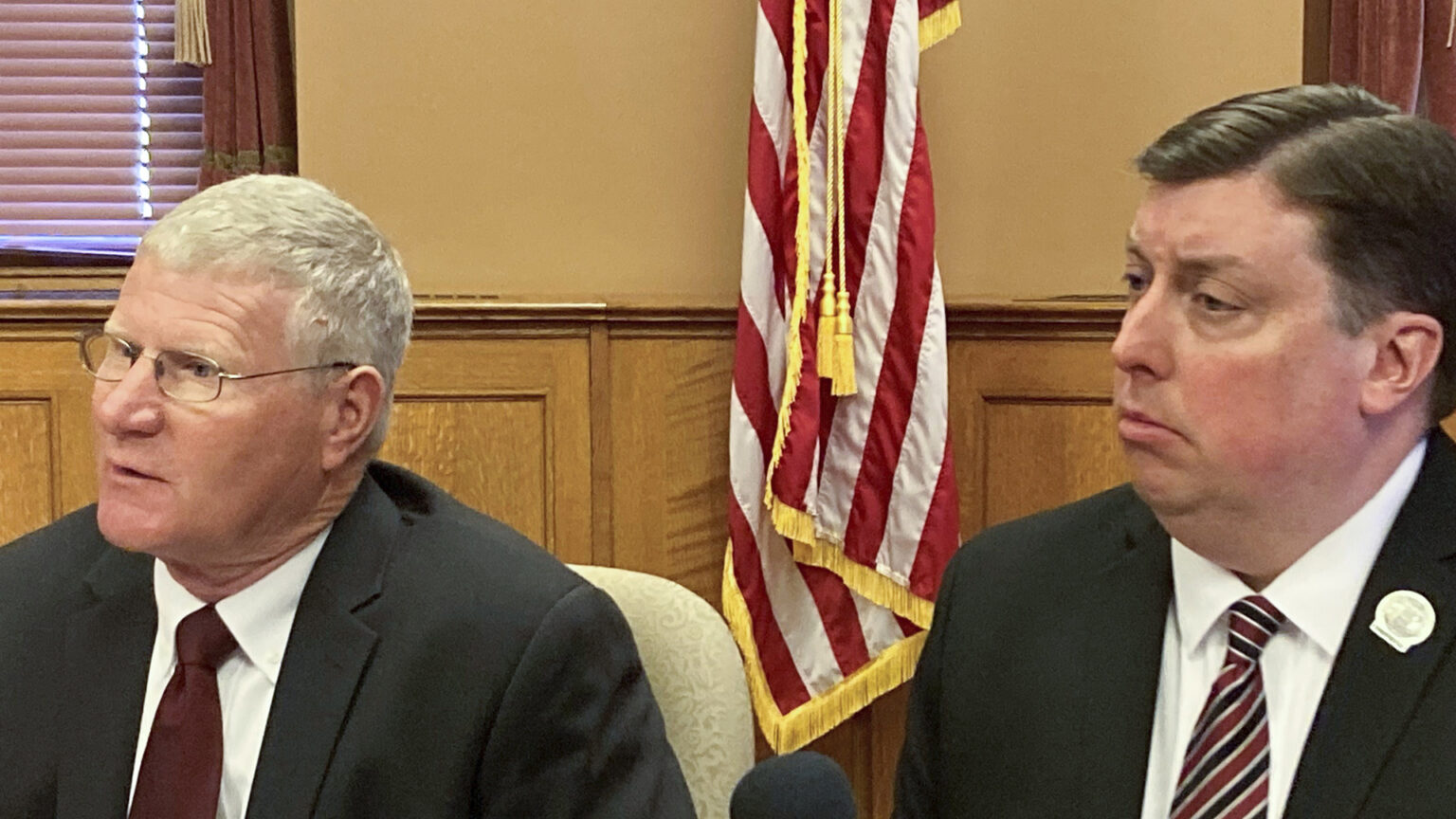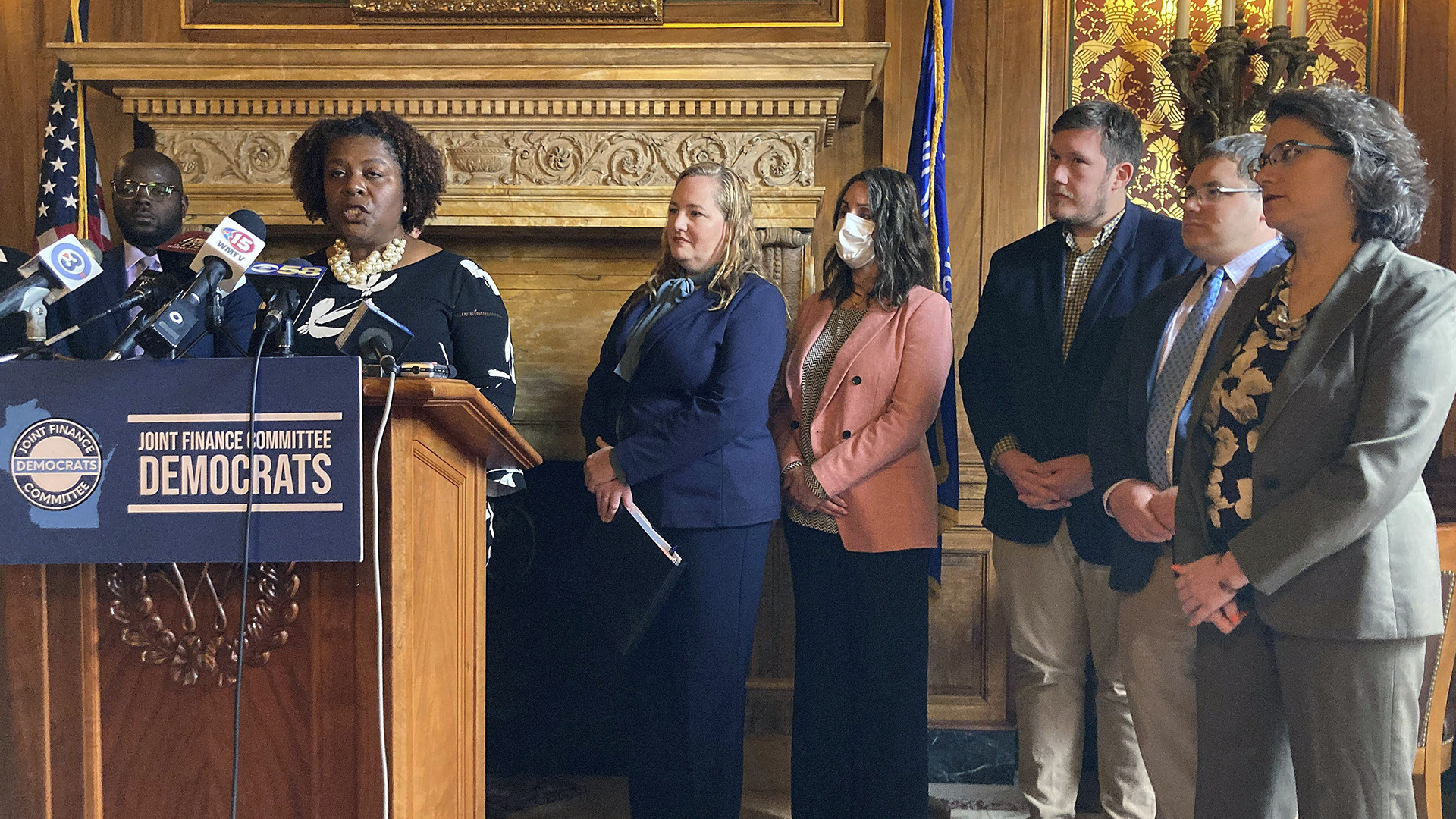Wisconsin Republicans reject proposals to legalize marijuana, fund Brewers stadium, create family leave program
The Republican-controlled Wisconsin Legislature's Joint Finance Committee scrapped more than 500 spending priorities proposed by Democratic Gov. Tony Evers in a single vote as it starts writing a budget.
Associated Press
May 2, 2023

Republican co-chairs of the Wisconsin Legislature's budget committee state Sen. Howard Marklein, left, and state Rep. Mark Born explain why they are voting to reject more than 500 proposals from Gov. Tony Evers' state budget at a Capitol news conference on May 2, 2023, in Madison. (Credit: AP Photo / Scott Bauer)

MADISON, Wis. (AP) — Wisconsin Republicans voted May 2 to kill proposals to legalize marijuana, pay for renovations at the Milwaukee Brewers’ stadium and create a paid family leave program, moves that Democratic Gov. Tony Evers derided as “foolish.”
The Legislature’s Republican-controlled budget committee killed more than 500 proposals from Evers with a single vote.
Evers had proposed tapping the state’s record-high $7 billion budget surplus to pay for a wide array of spending priorities that Republicans ultimately rejected.
“These aren’t fringe ideas, controversial concepts, or Republican or Democratic priorities — they’re about doing the right thing,” Evers said on Twitter after listing more than a dozen items being killed. “With a historic surplus comes historic responsibility, and today, when we can afford to do more, this vote is foolish and a wasted opportunity.”
The move comes as no surprise after Republicans, who control the state Legislature with large majorities, did the same with Evers’ previous two budgets and said they would do again in 2023. The vote kicks off the committee’s work reshaping the nearly $104 billion two-year budget that Evers submitted in February.
Republican co-chairs of the committee said they were optimistic the final spending plan would find bipartisan support and be signed by Evers.
“We’ll build a budget that’s a good budget for Wisconsin that he’ll want to sign when we send it to him because of all the good things in it,” said Rep. Mark Born ahead of the committee’s vote.
Democrats accused Republicans of acting against the wishes of voters on issues like Medicaid expansion and marijuana legalization that polls show have broad support.
“This is a popular budget,” said Democratic Rep. Evan Goyke, a member of the budget committee, at a news conference prior to the vote. “People like the policies in the governor’s budget. They support the policies he proposed.”

Wisconsin Democratic state Sen. LaTonya Johnson joins with other Democrats at the Capitol in speaking out against Republican plans to scrap Gov. Tony Evers’ budget proposal, including plans to legalize marijuana and expand Medicaid, on May 2, 2023, in Madison. (Credit: AP Photo / Scott Bauer)
Starting May 2, and likely continuing into June, the Joint Finance Committee will take a series of votes to build its own two-year spending plan which will then go to the Senate and Assembly for approval. Once passed, Evers can make changes through his powerful veto, which is what he did with the past two budgets he signed that included both Republican and Democratic priorities.
Evers proposals stripped from the budget on May 2 include: a 10% income tax cut targeting middle- and low-income earners; $270 million to add more mental health providers in schools; and freezing enrollment in the state’s private school voucher program.
Republicans have been working on their own plans to cut income taxes, increase mental health services in schools and expand funding for the school voucher program.
Other Evers proposals that Republicans have long opposed, and also killed, included accepting federal Medicaid expansion, raising the minimum wage, implementing automatic voter registration and repealing the state’s right to work law.
Evers won reelection in November 2022, while Republicans increased their majorities in the Legislature — taking advantage of maps they drew that strengthened their hold on legislative districts.
Evers, citing broad support as measured by public polls, called for legalizing both recreational and medical marijuana. Republicans have long resisted legalizing recreational marijuana, but Assembly Speaker Robin Vos said in April he hopes to bring a medical marijuana bill to a vote in the fall.
Evers’ paid leave plan would have created a program for both public and private sector workers giving them 12 weeks of family and medical leave starting in 2025.
Evers also called for spending $290 million to repair American Family Field in Milwaukee, where the Brewers play. Vos said in March that the plan would not pass and that Republicans were working on their own alternative to extend the team’s lease, which is scheduled to expire in 2030. Evers’ proposal would have extended it by 13 years, through 2043. The Republican stadium plan is expected to be debated outside of the budget.
Other big aspects of Evers’ budget remain, for now, but will almost certainly be changed by Republicans.
That includes Evers’ plan to increase special education funding by $1 billion and allow schools to spend $350 more per student in the 2023-24 school year and $650 more the following year, increasing state-imposed revenue limits. There was no increase in the revenue limit the past two years, which is the maximum amount school districts can bring in through property taxes and state aid. Currently, schools get $742 per student.
Born said Evers proposals not removed on May 2 were still being negotiated.
 Passport
Passport











Follow Us